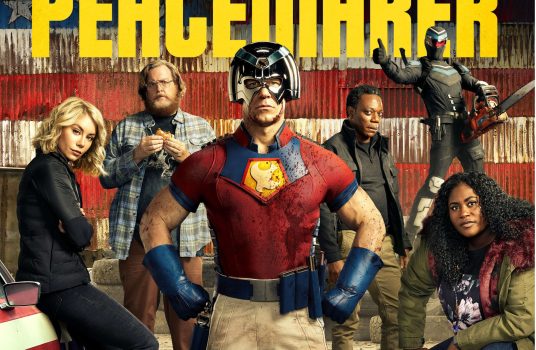Writing Lessons From... Only Murders in the Building and Peacemaker aka Killing Off a Great Character
Listen to the blogcast episode here:
I put off watching season four of Only Murders in the Building, because of course we all knew who was dead. We all knew whose murder we’d be investigating, because the next body shows up at the end of the previous season.
And I just couldn’t quite cope with it.
It was only a matter of time, with a show like Only Murders, that characters we love would start getting killed off.
Despite this, it wasn’t something I’d really considered. Mostly because I didn’t bother to think about it. You can have that luxury when it’s not your story you’re telling.
It meant that finally watching the fourth season of Only Murders got me thinking about this topic: how do we kill off a favourite character, and should we do it at all?
Cue the Only Murders theme music…
There are no big spoilers for Only Murders here, but there are minor ones so you might not want to read on until you’ve watched it.
I’m also going to talk about Peacemaker, and there’s a big spoiler for that coming up!
(Only Murders in the Building is on Disney+ and Peacemaker is on SkyMax. Both are brilliant in their own ways.)

Before we get into the gritty, does anyone actually skip the theme music for Only Murders? Why?! It’s one of the best things about the show, and that’s saying something because the show is amazing!
In the Arconia apartment building, home of many a wealthy, interesting person (including Sting to begin with!), in New York, live actor Charles (Steve Martin), Broadway producer Oliver (Martin Short) and artist Mable (Selena Gomez – except she doesn’t live there anymore, it’s complicated).
They’re big fans of a true crime podcast and become friends after discovering this in common when everyone is kicked out of the building due to a body being found inside. Deciding to start their own true crime podcast, the three set about proving that it was murder, not suicide.
By the fourth season, the podcast is a huge hit and Hollywood has come knocking, and we have our fourth murder in the Arconia.
It’s Sazz. Charles’s stunt double, the sassy, kind, confident, wonderful Sazz, gone missing and found cremated in the building’s incinerator.
The whole season becomes a beautiful, wrenching legacy to the character of Sazz, who it turns out, we hardly knew.
We don’t just get to learn her back story, we also learn how helpful she was, how kind she was to other stunt people, seeing potential, becoming a mentor, and how stunt doubling was taking its toll. We see how important she was to everyone whose path she crossed, how she was doing her own investigations, and what her hopes and dreams were.
If I was crushed at the end of season three when Sazz was shot, season four broke me.
What’s this Peacemaker you speak of?

Peacemaker is a DC Comics TV series about… well, Peacemaker (John Cena). Following on from the movie Suicide Squad, we find Peacemaker in hospital, on his way to prison. He’s still an idiot and he still wants to bring peace to the world, mostly by killing people.
Recruited to a secret mission, to avoid prison, Peacemaker, real name Chris Smith, must join a team to bring down an alien species known as the Butterflies, who are trying to take over the world. Obviously.
The series itself is so much better than I thought it would be. Sure, it’s full of boy humour, but it’s actually really well done. John Cena’s a fantastic actor! Maybe (I think he is) better than Dwayne The Rock Johnson, if we’re comparing wrestlers-turned-actors.
We get to find out who Peacemaker really is and why, because otherwise there’s no character development and therefore no point. Raised by a white supremacist, we learn that Chris had no choice but to grow into the idiot man he is. He’s confused and conflicted. He’s good, with a good heart, raised by an evil man (his father, Auggie Smith) so filled with hate that he’s brainwashed his son into fighting against that good.
And that evil man is played by… drum roll please… Robert Patrick. Yes! The Terminator in Terminator 2! He’s an amazing actor, but of course, as a true villain, he must die. And thanks to his relationship with his son, it must be Chris who kills Auggie.
It’s a scene that has to happen and it’s entirely satisfying when it does.
Still, my heart ached a little (after I whooped and punched the air!).
No more evil bad guy played so brilliantly by Robert Patrick.
No more devil sitting on Chris’s shoulders.
Maybe no more good conflict.
Because the best conflict in Peacemaker comes from Chris trying to reconcile his past with his father.
It’s not exactly killing off a favourite character, or even a likeable one, but in Peacemaker, it’s an important character who gets killed off. How can the series continue in a meaningful way without that character whose conflict created such a strong undercurrent through the whole thing?
The solution is simple, because the best things usually are.
Chris still sees his father. He’s still haunted by him. You don’t spend forty years of your life being brainwashed by someone you thought loved you only to forget all about them when they die.
Chris is truly haunted.
Which mean Robert Patrick is still in Peacemaker.
Chris’s father can no longer physically hurt him, is no longer a real threat, but that conflict and tension still exists, because there’s the manifestation of his dad talking down to him at his lowest moments, during the moments of doubt, and Peacemaker has plenty of those.
The best dead don’t truly die
Which brings us back to Only Murders, because when Sazz was killed off, I mourned the fact that she wouldn’t be in season four.
But, of course, she is!
She’s haunting Charles. She’s right there, beside him, helping him piece things together, pushing him to find her murderer, to solve the case, to make her dreams a reality.
In order for this to work – the bringing back of the dead – you need excellent character development. You need those connections, you need to know who would be haunted by this character and why, and you need that connection to be believable.
The death must also serve a purpose. It must advance the plot, or be integral to it. There is no murder in the building without Sazz’s death in season four, there is no character arc for Chris without Auggie’s death in Peacemaker.
Everything in a story must exist for a reason, it must serve a purpose, and some characters are created to die.
But, even when a character must be killed, they can live on.
It’s said that no one truly dies until people stop speaking their name.
You might have such a great antagonist who must die, but for them to die and leave means losing something beautiful. A haunting, through guilt, illness, fantasy, grief or literally a ghost, keeps your antagonist there, still doing their job of making your main characters’ lives miserable.
Killing off a favourite character, even the best character, doesn’t have to mean the end. Even if they don’t come back as a voice in the head or as a ghostly manifestation, they will be remembered, they can steer the plot, they can write the script.
They can live on, and in the case of the great characters like Sazz, you, as their writer, can build them the legacy they deserve.


